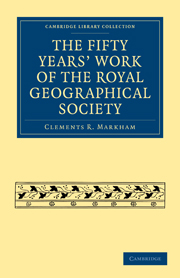Book contents
- Frontmatter
- Contents
- CHAPTER I THE FATHERS OF ENGLISH GEOGRAPHY
- CHAPTER II THE ROYAL SOCIETY
- CHAPTER III THE AFRICAN ASSOCIATION
- CHAPTER IV THE RALEIGH CLUB
- CHAPTER V FOUNDATION OF THE ROYAL GEOGRAPHICAL SOCIETY
- CHAPTER VI PRESIDENTS AND SECRETERIES OF THE ROYAL GEOGRAPHICAL SOCIETY, 1830–50
- CHAPTER VII PRESIDENTS AND SECRETARIES OF THE ROYAL GEOGRAPHICAL SOCIETY, 1851 TO 1881
- CHAPTER VIII EXPEDITIONS PROMOTED BY THE ROYAL GEOGRAPHICAL SOCIETY, AND GRANTS OF THE ROYAL AWARDS, 1830–55
- CHAPTER IX EXPEDITIONS PROMOTED BY THE ROYAL GEOGRAPHICAL SOCIETY AND GRANTS OF THE ROYAL AWARDS, 1855–1880
- CHAPTER X PUBLICATIONS OF THE SOCIETY—LIBRARY AND MAP ROOM—EDUCATIONAL MEASURES
- CHAPTER XI PROGRESS OF THE SOCIETY
- CHAPTER XII COMPARATIVE VIEW OF GEOGRAPHICAL KNOWLEDGE IN 1830 AND 1880, WITH A NOTICE OF THE WORK THAT STILL REMAINS TO BE DONE
- APPENDIX
CHAPTER IX - EXPEDITIONS PROMOTED BY THE ROYAL GEOGRAPHICAL SOCIETY AND GRANTS OF THE ROYAL AWARDS, 1855–1880
Published online by Cambridge University Press: 29 August 2010
- Frontmatter
- Contents
- CHAPTER I THE FATHERS OF ENGLISH GEOGRAPHY
- CHAPTER II THE ROYAL SOCIETY
- CHAPTER III THE AFRICAN ASSOCIATION
- CHAPTER IV THE RALEIGH CLUB
- CHAPTER V FOUNDATION OF THE ROYAL GEOGRAPHICAL SOCIETY
- CHAPTER VI PRESIDENTS AND SECRETERIES OF THE ROYAL GEOGRAPHICAL SOCIETY, 1830–50
- CHAPTER VII PRESIDENTS AND SECRETARIES OF THE ROYAL GEOGRAPHICAL SOCIETY, 1851 TO 1881
- CHAPTER VIII EXPEDITIONS PROMOTED BY THE ROYAL GEOGRAPHICAL SOCIETY, AND GRANTS OF THE ROYAL AWARDS, 1830–55
- CHAPTER IX EXPEDITIONS PROMOTED BY THE ROYAL GEOGRAPHICAL SOCIETY AND GRANTS OF THE ROYAL AWARDS, 1855–1880
- CHAPTER X PUBLICATIONS OF THE SOCIETY—LIBRARY AND MAP ROOM—EDUCATIONAL MEASURES
- CHAPTER XI PROGRESS OF THE SOCIETY
- CHAPTER XII COMPARATIVE VIEW OF GEOGRAPHICAL KNOWLEDGE IN 1830 AND 1880, WITH A NOTICE OF THE WORK THAT STILL REMAINS TO BE DONE
- APPENDIX
Summary
When the prosperity of the Society rapidly began to increase under the fostering care of Admiral Smyth and Sir Roderick Murchison, it was not long before active aid to labourers in the field began again to combine with rewards for work achieved, in the furtherance of the cause of geography. As the funds of the Society increased, the encouragement and power to assist explorers increased also, but such aid mainly took the direction of African discovery.
In briefly recording the Society's work, it will be convenient to treat of each continent or great division of the globe separately, beginning with Asia, and then taking in order Africa, Australia, America, and finally the Arctic Regions.
So far as English labours are concerned, the most important Asiatic exploration has been undertaken from India, and generally under the orders of the Survey Department. It was therefore a well merited recognition of the value of the Indian Surveys when, in 1857, the Patron's Gold Medal was awarded to Sir Andrew Scott Waugh. The grant was made for his able extensions of the Great Trigonometrical Survey, and especially for his work in fixing 79 Himálayan peaks, one of which—Mount Everest (29,002 ft.)—is the loftiest mountain in the world. After his retirement in 1861 Sir Andrew Waugh was many years a Member of our Council, and a Vice-President, actively assisting us, almost until his lamented death in February 1878.
- Type
- Chapter
- Information
- The Fifty Years' Work of the Royal Geographical Society , pp. 69 - 96Publisher: Cambridge University PressPrint publication year: 2009First published in: 1881



